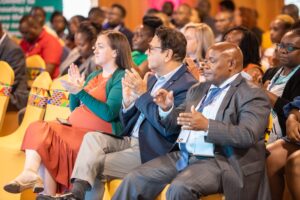
By Melissa Mongina.
Education technology experts from East Africa have convened in Nairobi to explore strategies for advancing digital learning in the region, including Kenya. The gathering brings together digital technology innovators, software developers, engineers, and others to exchange insights on overcoming the challenges hindering access to digital learning tools and technologies.
Speaking during the Edtech Summit 2023 Wednesday, Mark Irura a technical advisor at FAIR Forward – Artificial Intelligence for All, suggested the need to develop a localized Artificial intelligence(AI) that will be able to understand local languages such as Swahili. According to him, AI has been around for more than 50 years but it became a new thing due to a lot of open AI and chat gpt.
“So AI has been with us for more than 50 years probably. But it all grew up sometime at the end of last year when we had a lot of open AI and chatgpt. So then it became like this new thing, but it’s something that has been with us throughout,” noted Mark.
He also addressed concerns about students using AI, like ChatGPT, for their assignments, referring to this as natural language processing. Mark emphasized its relevance to Africans and their need to build models capable of comprehending and generating text like humans.
“I think many of us, especially the people in academia have spoken about students who are now turning out assignments using chat GPT. So it’s a large number of models, typically, and we have had the controversies around this,” he adds, “It’s an area I call natural language processing, and I think this is very relevant to us as Africans. So in this particular field, we build a model that can understand, it can compass, and it can generate text as if it were a human being.”
According to Mark, the tools they have now predominantly come in Western languages such as German Spanish, and English. Their challenge right now is Swahili since it is underrepresented in technology yet it has over 400 million speakers in Africa.
“And particularly, the tools that we have right now, predominantly, are coming to us in what we call Western languages. So again, German, Spanish, and English. Swahili is spoken by more than 400 million speakers in Africa but it is underrepresented in in technology and many other languages that we speak. So this is one of the challenges that we have,” explained Mark.
Providing an overview of the summit’s second year, Jennifer Cotter-Otieno, Founder and CEO of EdTech East Africa and the event’s organizer, emphasized the collective effort required to build sustainable and effective solutions, ensuring that no one is left behind.
“There’s no one-size-fits-all solution. It will take all of us, along with the community, to create sustainable and effective solutions, ensuring that no one is left behind.” Said Jennifer Cotter- Otieno.
According to Lydia Mureithi, Deputy Director of the Centre for Mathematics, Science and Technology Education in Africa (CEMESTEA), the purpose of the meeting was to share ideas and explore ways of making learning globally competitive, integrate information technology in schools and the policies to strengthen or establish to make digital education more sustainable in line with global goals.
“We are meeting to share ideas and explore ways of how to make learning globally competitive; how to integrate information technology in schools and the policies to strengthen or establish to make digital education more sustainable in line with global goals,” said Lydia Mureithi.
